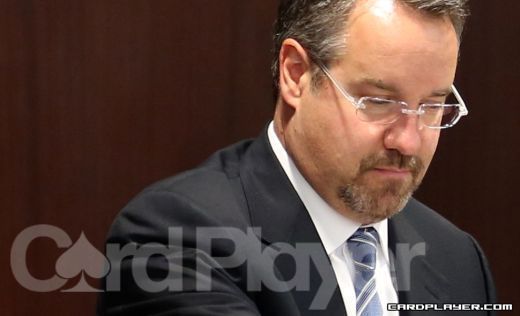






Former Nevada Gaming Control Board Chairman Talks About How Online Poker Arrangements Between States Might LookMark Lipparelli Says 'Far-Reaching Agreements' Not Ideal For Industry |
|
|

Former Nevada Gaming Control Board Chairman Mark Lipparelli knows online gaming as well as anyone. After being appointed to the Board in 2009, Lipparelli eventually was at the forefront of the Silver State’s charge into the Internet gaming business. In late 2011, Nevada became the first state in U.S. history to adopt regulations for online poker. Lipparelli stayed on the Board until September of last year, stepping down because he had chosen not to serve another term.
Thanks to leaving his position as a regulator, Lipparelli has returned to the private sector and has been working on a couple of projects in addition to some consulting.
Card Player had a chance to speak with him on Friday about what he sees happening in the near future with legal and regulated online gaming in the United States. He weighed in on federal efforts, which he said are likely dead, and what the industry will look like with states making arrangements to share player pools, and thus revenues.
Brian Pempus: What do you make of Nevada’s progress in the online gaming realm in the time since you left the Gaming Control Board?
Mark Lipparelli: Nevada is ready for its next chapter. Getting established was an important milestone, but now the policymakers need to focus on expanding to additional markets.
BP: Do you see a Nevada-New Jersey compact coming sometime next year like it was speculated by MGM’s CEO Jim Murren?
ML: I would say that it’s likely that state-to-state, multiple-market initiatives will begin in 2014. It’s a little more challenging to peg which states. I’m a believer that we’re going to see states begin to compact with each other or even allow cross-border access to markets, and maybe it wouldn’t even require a compact of any kind. That’s a likely thing to occur.
BP: Were Nevada’s web gaming regulations crafted in such a way to give flexibility to such opportunities and to mesh well with other jurisdictions that might have their own regulations?
ML: I think they were. It’s important that it’s done in that manner. The notion of having far-reaching agreements is not the right direction. Instead, permissions between states are more likely the way to go. I don’t think far-reaching agreements or compacts are a smart approach. That becomes too complex, and I think it will lead to long gaps of time. The more the policymakers can remain flexible the better off they’ll be.
BP: So you think some states could offer up their populations to the industry without the long legislative process, instead allowing it to come in from a licensed Nevada operator?
ML: I think that’s what I meant by permissions. There are several opportunities where it may be something akin to a state allowing participation in gaming markets where such operations are legal and licensed. That’s an important component. I could foresee some jurisdictions incorporating a change in the law that says something to the effect of that if it’s a licensed entity from another jurisdiction that such play can take place within that border. That’s a simple and effective approach. Not every state is going to try to navigate a complex regulatory and licensing structure. It may be most expedient for them to pass some sort of permissive law, assuming at the core of that is that entities that can access those markets are legal.
BP: Given all of this and the advanced nature of what’s happening in Nevada and New Jersey, do you think the ship has sailed for a federal online poker bill?
ML: I don’t anticipate that there’s much hope for any federal progress, which for me is a change in position. I think that the time for federal legislation is probably behind us.
BP: Do you say that because it would be hard to insert a federal regime into what’s already going on and that might be increasingly difficult as time goes on?
ML: Yeah, I’ve said in the past that the window of opportunity to get something in place was closing. I meant that. The window is essentially closed. There are several markets that are in the process of opening; commercial commitments have been made and licensing events have taken place. The time to act was during the last 24 months. The complexity associated with unwinding now is probably too great.
BP: What do you make of a state like Delaware, which has such a small population and is doing online gaming in a slightly different way than the others, and how do you see it fitting in?
ML: That’s why I made the point that the less complexity associated with cross-border play or multiple-markets play is going to be the way forward. Every state will have a slightly different set of criteria for how they set up, and in order for those states to interact everyone is going to have to remain fairly simple with their approach. Adding big complex operating agreements or compacts is going to make it very difficult once you get past the first state. I’ve made this point in the past; that even though the federal window is probably closed, the state-to-state regime is going to be a very complex animal, and the way to keep the complexity to a minimum is not to enter into far-reaching agreements because the next jurisdiction that gets added…you don’t want to be put in the position of having to make too many concessions. It could potentially block the ability of states to enjoy cross-market play. Delaware obviously is going to have to entertain the notion of cross-market play every bit as much as Nevada and New Jersey.
